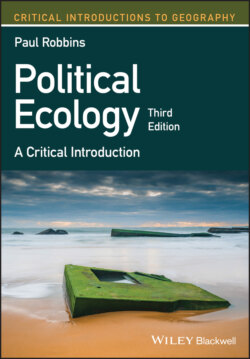Читать книгу Political Ecology - Paul Robbins - Страница 10
Оглавление
Preface to the Third Edition
The 15 years between the first edition of this book and the one you now hold in your hands have continued to make the relevance and urgency of political ecology a difficult thing to gauge. On the one hand, the field has grown so dramatically, and in so many directions, that it is even easier to say of this contested enterprise that it has become too diffuse to matter. References to “political ecology” in the Web of Science database have more than tripled in the intervening years but now reflect a huge range of approaches. One might think that political ecology has finally “jumped the shark,” a phrase from the television industry suggesting the creative end of a franchise. I am sympathetic with those who may hurriedly wish to get on with the “next thing” as well as those who are still not sure what political ecology is, let alone whether it has a purchase on a special kind of explanation.
But the field is also marked by its ubiquity and vibrancy. Books with titles like Ecologies and Politics of Health (King and Crews 2013) and Land Change Science, Political Ecology, and Sustainability (Brannstrom and Vadjunec 2013) have shown how interest in political ecology has transgressed diverse disciplinary boundaries. A number of international political ecology networks, like ENTITLE and POLLEN, have emerged in the last several years, moreover, leaving the parochial Anglo‐American tradition behind and showing the energy of political ecology in Athens, Barcelona, Rome, Bangalore, Taipei, and beyond. Political ecology has fledged from the nest, for sure, and is now beyond any call to return to a marginal place in the footnotes. We are all political ecologists now, I suppose.
And if political ecology is no longer cutting‐edge, the world continues to be at the sharp end of vast entangled political ecologies. The United States has vowed retreat from international accords on climate change even while global consensus has connected the open sea lanes across the Northwest Passage with disastrous heat waves across Europe, increasingly uneven Asian monsoons, and cataclysmic calving Antarctic ice. Areas gazetted for conservation mushroomed in recent years without consensus on how to deal with the displacement of people and loss of productive resources this entails. Mining concessions have ballooned on indigenous land. Hazardous waste has perfected the habit of seeking out the world’s most marginal communities.
And Hurricane Katrina in 2005 came closer than perhaps any other single event of recent memory to tear back the veil on the structural inequalities of race and class in the United States, which are physically inscribed into the seascape, implicated in the ecological transformation of the coastal zone, and inseparably linked to the technologies that govern the flow of water through the Mississippi delta. That event came closer, but clearly not yet close enough. There is simply no way to pass through that obscure barrier without continuing to research, produce videos on, analyze, ecologically track, and mount soap boxes to shout about the swirling political and economic relationships that dialectically produce levees and slums, soils and dams, tourism and hunger, energy and climate, and people and things. I am forced to conclude that there is as much or more need for political ecology now than decades ago when my journey began, and the revised version of the book you have in your hands is the result.
Those familiar with the first and second editions will notice changes in the book, though perhaps fewer than between my last two efforts; I maintain a judicious attempt not to throw in the “kitchen sink.” I have attempted to update examples but many cases continue to draw on canon from the field. Many boxes have been added, including key recent works, but necessarily at the expense of some important older work. I have also made judicious cuts in the otherwise long‐winded prose, to the tune of 1 in 10 words or so. For those who miss my exegeses on the merits of cultural ecology, the 2004 edition is out there in circulation.
Most important, I have continued to stress, despite the frustration of some readers, that political ecology is not a method or a theory, nor even a single perspective. Rather, I maintain that political ecology is an urgent kind of argument or text (or book, or mural, or movie, or blog) that examines winners and losers, is narrated using dialectics, begins and/or ends in a contradiction, and surveys both the “objective” status of nature as well as stories about the status of nature.
In light of this last revelation, I have clung to the insistence that one might be a political ecologist only in the same way those who consistently and exclusively write gothic novels might be considered gothic novelists. But this should not encourage any of us – whoever we are or whatever we do – to shy away from researching, reading, writing, and witnessing political ecologies, whenever or wherever it is scientifically enlightening or socially and environmentally urgent. One need not be a political ecologist to mobilize the resources, or learn from the insights, of political ecology. I hope more non‐political ecologists continue to read and write political ecology; indeed, this may be our only hope.
